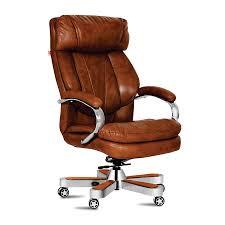Office Chair Market trends indicate that remote work adoption drives demand for ergonomic, adjustable, and multifunctional chairs suitable for home and corporate offices. Flexible seating solutions, including compact, modular, and mobile designs, address dynamic workspace needs. Manufacturers focusing on comfort, technology integration, and adaptable designs capitalize on these trends, enhancing adoption, market penetration, and global growth opportunities across corporate, co-working, and residential environments.
Remote Work Driving Adoption
Remote work has transformed workspace requirements globally. Employees working from home require ergonomic chairs that support long hours, maintain posture, and reduce fatigue. Compact and adjustable designs are preferred to accommodate limited home office space. Manufacturers responding to remote work trends develop versatile, health-oriented chairs suitable for residential environments. This shift creates new demand channels, expanding the office chair market beyond traditional corporate settings.
Flexible Seating Solutions
Flexible seating solutions are gaining popularity in both corporate and home offices. Modular chairs, mobile units, and stackable designs allow easy reconfiguration of workspaces. Adjustable features such as seat height, tilt, and lumbar support cater to diverse user needs. Flexibility enhances productivity and comfort, making these chairs appealing to dynamic office setups and hybrid work environments. Manufacturers offering adaptable seating gain competitive advantage and wider market acceptance.
Ergonomics and Comfort
Ergonomic design remains a central trend influencing remote work and flexible seating adoption. Adjustable armrests, lumbar support, contoured seats, and breathable fabrics reduce strain and support health. Comfort drives prolonged usage and improves productivity, appealing to corporate and home office users alike. Chairs combining ergonomics, comfort, and flexible design features attract diverse customer segments globally.
Technology Integration
Technology enhances the functionality of flexible office chairs. Smart features such as posture sensors, memory adjustments, and automated tilt mechanisms optimize comfort and efficiency. Integration of technology appeals to tech-savvy users and corporates implementing wellness programs. Manufacturers leveraging tech-enabled chairs differentiate products, supporting higher adoption in remote and hybrid work setups.
Corporate and Co-Working Spaces
Corporate offices and co-working environments increasingly adopt flexible seating solutions. Adjustable and modular chairs allow easy workspace reconfiguration to accommodate meetings, collaborative tasks, and hot-desking practices. Ergonomic and adaptable designs promote employee health and productivity. Manufacturers providing solutions for diverse workspaces capture broader market segments and strengthen brand positioning.
Home Office Expansion
Home office growth continues to drive demand for flexible seating solutions. Compact, adjustable, and ergonomic chairs address residential constraints while supporting productivity. Multifunctional designs offer both comfort and style for home users. Manufacturers developing versatile products suitable for corporate and home environments maximize market reach and sustain adoption trends driven by remote work.
Sustainability and Health Focus
Sustainable materials and eco-friendly production practices are increasingly incorporated into remote work and flexible seating solutions. Non-toxic fabrics, recyclable components, and energy-efficient manufacturing appeal to environmentally conscious buyers. Combining sustainability with ergonomic and adaptable features strengthens brand appeal and supports long-term market growth globally.
Regional Trends
Regional factors shape demand for remote work and flexible seating solutions. North America and Europe emphasize premium ergonomic designs with technological integration, while Asia Pacific, Latin America, and the Middle East focus on affordability, functionality, and compact designs. Understanding regional preferences enables manufacturers to tailor products, pricing, and marketing strategies, optimizing adoption across continents.
Future Outlook
The office chair market will continue expanding as remote work and flexible seating solutions drive adoption. Manufacturers focusing on ergonomic, adaptable, comfortable, and technologically advanced chairs will capture emerging opportunities in both corporate and home office segments. Sustainability and regional customization further strengthen global market growth. Flexibility and health-conscious designs ensure long-term relevance and competitive differentiation.
The office chair market demonstrates that remote work and flexible seating solutions are central to adoption, innovation, and sustained global growth in ergonomic office furniture.

